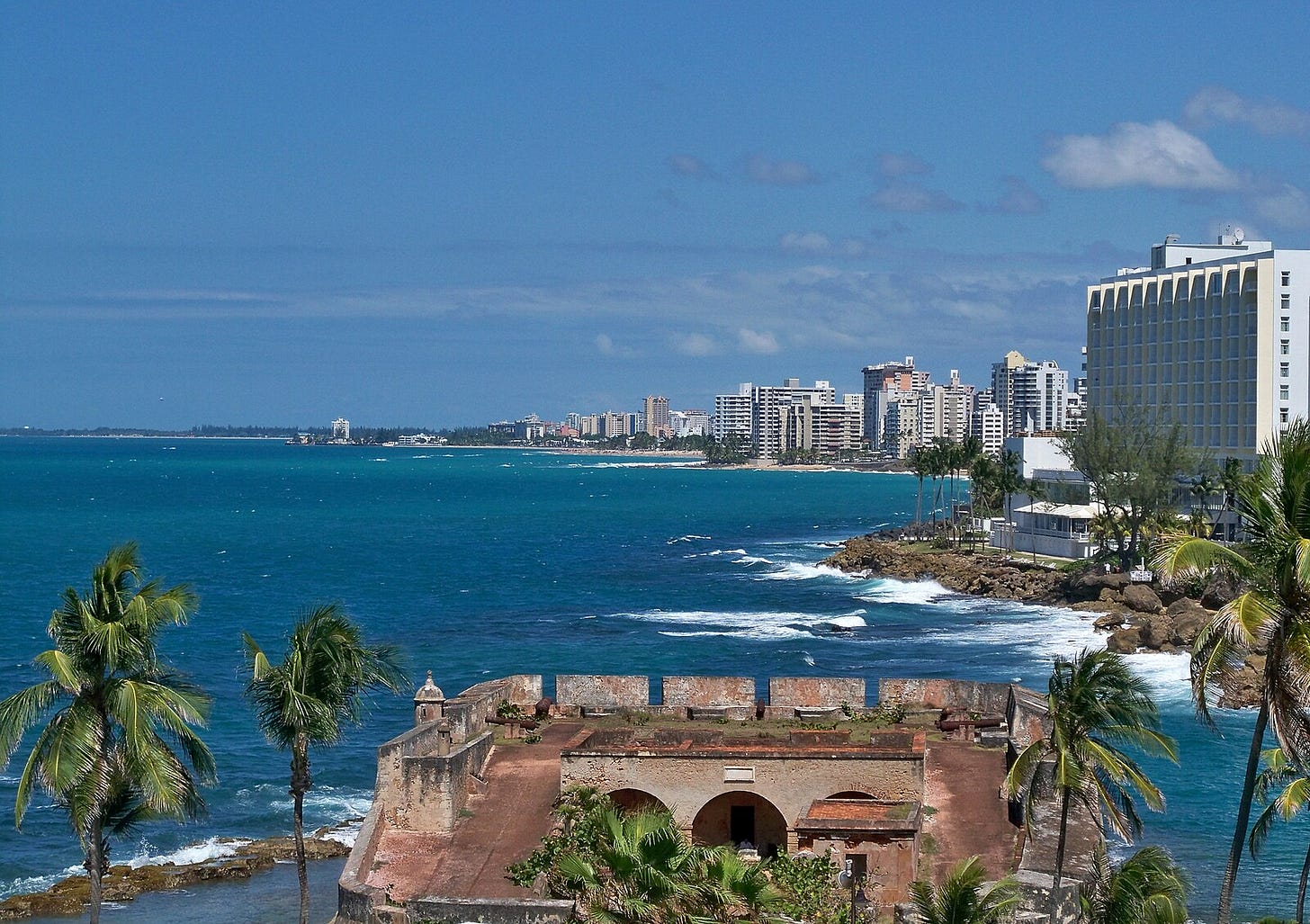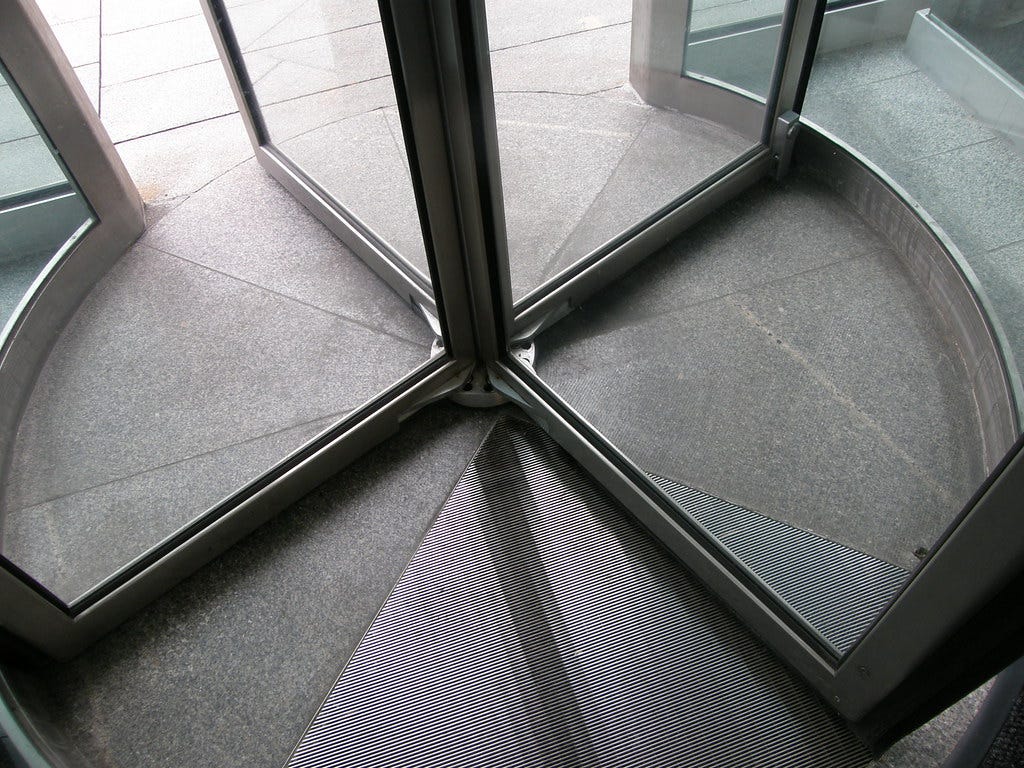From San Juan, Puerto Rico
FC 203 on ‘Life’s Like That’ was much appreciated both for its content and for the regularity with which FC is posted Sunday after Sunday. Believe me, it is going to be a daunting task as I operate from a different time zone and amidst frequent distractions.
My good friend Murali Neelakantan writes:
“Pras, remarkably, you have ensured that our mailbox has something from you every weekend. Congratulations on being able to do this when you could have made excuses every now and then, especially when you are on holiday or travelling.”
He then says: “Have you noticed that the fractions for coffee sharing in Karnataka are interesting - 1/2, 2/3,3/4,3/5,4/7,5/8? I don’t think I have ever heard of a group larger than 8 sharing coffee, but we probably wouldn’t need more fractions. There may well be an academic paper that could be written about this.”
⚓The Rich Port
I came to San Juan, the capital of Puerto Rico. I first learned that Christopher Columbus arrived in Puerto Rico in 1493 during his second voyage to the New World. Initially, Columbus christened the Island San Juan Bautista (St. John the Baptist). The name was soon changed to Puerto Rico, or ‘rich port’, when the Spaniards realized the impressive amount of gold found in its rivers. When the capital city was established, it took the name of San Juan.
In the late 1800s, the desire for independence from the Spanish crown boiled over in Puerto Rico. While the Spanish soldiers quickly suppressed the rebellion in San Juan, outbursts and uprisings erupted throughout the Island, which led the Spanish crown to grant autonomy to the government on the Island. This change opened trade channels with other European colonies and the United States.
The autonomous government granted by Spain didn’t last long. After the Spanish-American War ended in 1898, Puerto Rico and Guam were ceded to the United States as part of the terms of the Treaty of Paris, and Puerto Rico maintains its provincial status to this day.
Our guide on the walking tour mentioned that Puerto Rico has three main political parties, each of which advocates a different political status for the island. The two leading parties are the Popular Democratic Party, which supports the continuation of commonwealth status, and the New Progressive Party, which favours U.S. statehood. Together, these two parties have commanded virtually all the votes in elections since the late 20th century. The Puerto Rican Independence Party, which won one-fifth of the vote in 1952, is supported by about 5 per cent of the electorate.
Puerto Ricans have migrated to different parts of the USA, but the majority of them, according to our guide, have settled in and around Bronx, New York. They are referred to as Nuyoricans.
There are plenty of tourist spots. Water sports, kayaking and exploring the rainforest are the star attractions.
Bioluminescence Kayaking is by far the most popular. Have a look at the 🔗Bioluminescent Kayaking Puerto Rico Tour | Fajardo's Bio Bay. Also, have a look at the El Yunque Rainforest: 🔗Guide to Visiting El Yunque National Forest | Discover Puerto Rico
Hope this short travelogue was both interesting and informative.
🚪The Revolving Door
Revolving doors were designed as part of the architecture to facilitate simultaneous entry and exit, particularly in buildings where footfalls were heavy. Over the years, the revolving door has acquired a metaphorical meaning by applying it to situations where there was frequent churn of employees. Attrition was one reason for the revolving door to gain recognition.
It is common in India for retiring public servants to join Boards of companies or take up advisory roles. This may sound normal, but a conflict of interest lurks beneath this move. Take, for example, an officer in the Petroleum Ministry involved in policy formation who retires and joins the Board of a Company engaged in a business that benefitted from some of those policies. Is this move a quid pro quo? Hard to say? It is quite possible that the Industry experience the officer has may help the company bridge the skill gap at the Board. The fact remains that there’s a revolving door that facilitates the migration of public servants to the private sector.
The revolving door for the IT sector seems to revolve at a much faster pace than in other sectors. Lay-off, retrenchment and other means of shedding manpower. The door is kept revolving for techies whose marketability helps them quit and join in a wink. It is not just that, techies and others with similar flexibility are today opting for work from home, making the revolving door a conduit to their home.
Freeloaders and opportunists of every kind are forever looking for revolving doors to hop from one unsuspecting target to the other. When I was working in Mumbai, there was a colleague who used to just tag along with whoever was heading out for lunch. He used to help himself to what was ordered and made no effort to pay, hiding behind the excuse that he was just tasting.
This continued until we, a group of four, hatched a plan. We went to a restaurant in Churchgate and as the meal ended, each one of us got off the table pleading one excuse or the other. One of them went to the washroom and waited long enough to make sure that the bill would have been presented to our freeloader friend. When eventually he came out the waiter met him with the bill saying “The person who came with you just left saying that you guys would be annoyed if he paid the bill”. Sure, we got rid of the freeloader, but he was quick to tag on to another group of diners.
In a social context, the term ‘revolving door’ can be applied to describe the cycle of addiction and the number of attempts made at rehabilitation beyond just employment. It has been used to describe a cycle of addiction or repeated failed attempts at rehabilitation.
In a political context, not any different from the current, the frequency with which politicians cross over from one party to another confirms that there exists a revolving door for such opportunistic elements.
End Quote: My life is not like a revolving door where you can come and go as you please.
I have to be on an early morning flight to Atlanta. So, I am going to sign off. Until next week, please take good care of yourselves. Ciao!






Excellent Pras.
Always looking forward for your FC posts and I prefer a SUNDAY to enjoy the brew. Keep it up
What an insightful read! I never knew that this term was extensively used in this manner whether in employment or politics! We learn everyday! Thanks for sharing your experience